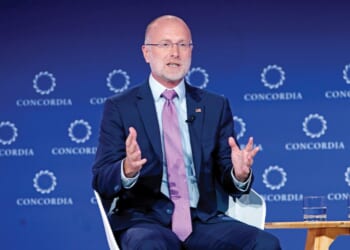On Thursday, President Donald Trump signed an executive order that will finally put an end to banks’ discrimination against conservatives, Christian groups, and other organizations.
The order requires that federal banking regulators eliminate references to reputational risk and similar concepts in their guidance and examination procedures. Additionally, it directs the Small Business Administration to compel financial institutions to take steps to restore access to services for current or prospective clients who were previously denied services due to an illegal debanking policy.
The Trump administration has said previously that under the Biden administration, regulators used reputational risk to coerce banks to take aggressive actions against disfavored businesses and conservative organizations.
Regulators will also examine whether financial institutions have implemented politically driven debanking policies, and, if so, pursue appropriate enforcement steps, including financial penalties.
The executive order further directs federal banking agencies to analyze supervisory records and consumer complaint data to uncover any unlawful denial of financial services tied to religious affiliation. When such violations are identified, they must be referred to the attorney general for further action.
Most importantly, Trump’s order requires the Treasury Department to craft a plan to permanently stop debanking practices. Treasury Secretary Scott Bessent will be responsible for outlining potential legislative proposals and regulatory reforms aimed at preventing this form of discrimination in the future.
A Huge Win for Freedom
Although more regulations will still need to be issued by the White House, what we have seen so far suggests Trump’s order is a gigantic victory for liberty.
Under previous administrations, banks were allowed to discriminate against many nonprofit groups, lawful businesses, and even individuals they did not like, making it difficult for those organizations and people to survive. In many cases, banks were pressured by large investors, activist groups, and political leaders to use their financial might to shove America further to the left.
Numerous examples of alleged discrimination and discriminatory policies imposed by financial institutions exist.
For example, in 2022, JPMorgan Chase came under fire after the National Committee for Religious Freedom, a nonprofit committed to defending religious liberty, reported that the bank had abruptly closed its accounts without clear justification. The group is headed by former U.S. Senator Sam Brownback, a longtime advocate for faith-based rights.
In 2023, Wells Fargo shut down a line of credit belonging to a Florida-based firearms dealer. The bank explained the move by citing internal guidelines that prohibit lending to certain categories of businesses — an all-too-familiar excuse that’s increasingly being used to marginalize industries disfavored by the political left.
Trump knows about the perils of bank discrimination firsthand. He and his family have been mistreated by banks for years.
“The banks discriminated against me very badly,” Trump said on CNBC’s Squawk Box show last week. “They totally discriminate against — I think me maybe even more, but they discriminate against many conservatives.”
Trump claims that in a politically motivated move, JPMorgan Chase unexpectedly gave him 20 days to transfer “hundreds of millions of dollars in cash” to another institution.
He then approached Bank of America CEO Brian Moynihan, who told Trump, “We can’t do it.”
Even former First Lady Melania Trump says she’s experienced de-banking. In her 2024 autobiography Melania, she revealed that a bank — whose name she deliberately withheld — closed her personal accounts without explanation and refused to open an account for her son, Barron Trump. She suggested the decision was driven by political bias.
Targeted Industries
These cases are just the tip of the iceberg. Banks have openly admitted and even bragged about developing long-term debanking strategies designed to harm specific industries that have been deemed unfavorable by elites.
Citigroup, for instance, created a policy in 2018 restricting bank services related to firearm manufacturers. The decision came immediately after the Parkland school shooting, at a time when left-wing groups were demanding corporations take action to reduce certain kinds of gun ownership and use. (In June, following pressure from the Trump administration, Citigroup reversed its policy.)
During the Biden administration, America’s six largest banks, including Bank of America and Goldman Sachs, committed to a long-term plan to phase out fossil-fuel-related companies from their financing operations. The move would have effectively killed the fossil-fuel industry and countless related businesses.
A Long-Awaited Course Correction
President Trump’s executive order is a long-overdue course correction. For too long, America’s most powerful financial institutions have acted as ideological enforcers for the left, punishing dissent and driving conservative voices out of the marketplace.
By taking on the banks and the regulators that shielded them, Trump is doing what no other president has had the courage to do: defend the forgotten men and women who have been debanked, deplatformed, and silenced in their own country. This is a watershed moment in the fight for free speech, religious liberty, and economic freedom.
Of course, Trump won’t be in office forever, and executive orders can be reversed. That’s why now is the time for Congress to step up. Lawmakers must move quickly to codify the executive order into permanent law.
The American people deserve financial institutions that serve all law-abiding citizens, not just those who align with the ruling class’s preferred ideology.
Justin Haskins (Jhaskins@heartland.org) is the director of the Socialism Research Center at The Heartland Institute and a New York Times bestselling author.















